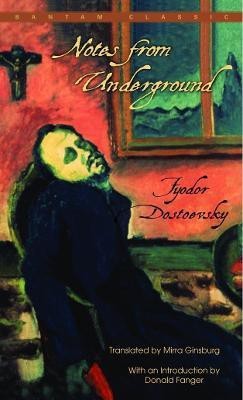Notes From Underground(English, Paperback, Dostoevsky Fyodor)
Quick Overview
Product Price Comparison
Notes From Underground, written by Fyodor Dostoevsky, is a classic piece of literature which portrays the utter despair of an intelligent educated man as he laments his helplessness in modern society Summary Of The Book The Unnamed as he is popularly referred to, is the epitome of disillusionment with the world and society. A man beset with despair, he represents the struggles of identity, morality and of free will. The only information provided about him is that he is a retired civil servant living in St. Petersburg. Notes From Underground is divided into two parts. The first part starts out with the Underground Man announcing that he is a sick and wicked man. His misanthropic attitude shines through his bleak statement. He holds the view that educated and knowledgeable people should be as miserable as he is. He holds utilitarian philosophy in contempt. He prizes free will over all and states that man will do anything, even something that is seemingly useless and unproductive, just to assert his freedom. His inability to overcome his useless behaviour further drives him into despair. The second part, which is titled ŌĆ£Apropos of the Wet SnowŌĆØ, showcases events from the time when the Underground Man was 24. Taking place in the 1840s, specific instances are laid out showing his transformation from an idealistic young man to a jaded individual filled with self loathing. His social alienation is evident in various everyday encounters, from making way for a soldier, to an unsuccessful meeting with friends, and an encounter with a prostitute. The existential questions evoked through him challenged the prevailing norms of society, even provoking existing and accepted western thoughts. The artificiality of the so called educated, the helplessness of the conscious man in modern society and a rebellion against the realistic school of thought, are the themes evoked in Notes From Underground. About The Authors Fyodor Dostoevsky, born on 11 November 1821, was a Russian novelist, philosopher, essayist and short-story writer. His works include Poor Folk, Crime and Punishment, The Idiot, Demons, The Brothers Karamazov, The House of the Dead and The Gambler. DostoevskyŌĆÖs work revolves around the portrayal of the complex human psyche in the context of 19th century Russia, which is peppered with social, political and ideological chaos. He was educated as an engineer and carried out the profession briefly. After his imprisonment, he worked as a journalist while also seriously pursuing his own writing. He passed away on February 9th, 1881. Donald Fanger teaches literature at Harvard University. His other works include Dostoevsky and Romantic Realism: A Study of Dostoevsky in Relation to Balzac, Dickens, and Gogol, and GorkyŌĆÖs Tolstoy and Other Reminiscences: Key Writings by and about Maxim Gorky. He specializes in 19th and 20th Century Russian, English and French Literature. He received his PhD in Comparative Literature from Harvard University. Mirra Ginsburg is an accomplished translator, author of childrenŌĆÖs books and editor. Some of her works include Master and Margarita, Azef, A History of Soviet Literature, and The Diary of Nina Kosterina. She started translating Russian works to earn a living. She has won acclaim for her translations. She passed away in 2000.


